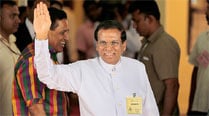Opinion Let them speak
The new government in Colombo promises to devolve political power to Tamils. It may help start a conversation.

 But does the Sirisena win herald a new politics and a new Sri Lankan state that would seek to reconstitute itself as a multi-ethnic, linguistic and religious nation, and initiate a fresh pact with its minorities?
But does the Sirisena win herald a new politics and a new Sri Lankan state that would seek to reconstitute itself as a multi-ethnic, linguistic and religious nation, and initiate a fresh pact with its minorities?
The presidential election in Sri Lanka was a vote on the record of Mahinda Rajapaksa, president for nearly a decade. The anger and dissatisfaction against Rajapaksa was widespread but acute among Tamils and Muslims, who together make up about 25 per cent of Sri Lanka’s population. The two groups voted overwhelmingly against Rajapaksa; it could be argued they won the election for Maithripala Sirisena. But does the Sirisena win herald a new politics and a new Sri Lankan state that would seek to reconstitute itself as a multi-ethnic, linguistic and religious nation, and initiate a fresh pact with its minorities? Will the new administration risk the anger of ethnic and religious chauvinists and trust the minorities, especially Tamils, to become equal partners in building the nation? Initial signs are promising.
One of the first executive decisions of the Sirisena administration was to replace the governor of the Northern Province, a retired military official, with a civilian. Last week, the new foreign minister, Mangala Samaraweera, was in New Delhi and indicated a course correction in foreign policy. On Tuesday, in his first address to parliament, new Prime Minister Ranil Wickremasinghe announced that the 13th Amendment to the Sri Lankan constitution, an outcome of the 1987 Indo-Lanka accord meant to devolve more powers to the provinces, would be implemented within a unitary state.
These gestures are, of course, important to start a conversation on healing and reconciliation between Colombo and the Tamils. The reconciliation process has to begin with the winner recognising that he needs to suspend the aura of victory and shun triumphalism to reach out to the defeated.
Since the 1950s, successive Sinhalese-led governments have discriminated against the Tamil minority. Tamils took to violence after Sinhalese political parties refused to respond to the non-violent and rights-oriented politics of Tamil groups. Extremists gained public support only after the 1983 riots and the Tamils’ democratic struggle for equal rights turned into a full-fledged national liberation struggle. The LTTE became the face of the liberation movement because it methodically annihilated dissenting voices in the community. Both the LTTE and the Sri Lankan state negotiated, but deceit always clouded the process. The brutal and long-drawn-out war has ended and the LTTE has been crushed. But the root causes of the war have not been addressed. In the final phase of the war, the Sri Lankan army didn’t spare civilians, earning censure from world capitals and at UN forums. The Rajapaksa administration was accused of war crimes and genocide against Tamils.
The Sirisena administration seems to recognise that a settlement of the Tamil issue is necessary to improve Colombo’s ties with Delhi and the rest of the world. There is a Tamil nation bound by language and culture that exists outside the political boundaries of Sri Lanka and India. It is a nation without any army, but one that has sufficient political, economic and cultural clout to convince the world of the merits of its case. Political and civil society actors in Tamil Nadu have ensured that Delhi had to factor in the plight of Sri Lankan Tamils in its engagement with Colombo. The Sri Lankan Tamil diaspora in Europe and North America has argued the case of their subjugated brethren internationally. With the LTTE absent from the picture, the onus has been on Colombo to effect a reconciliation with Tamils. Rajapaksa won the war but wasn’t interested in winning over Tamils.
Listen to C.V. Wigneswaran, the chief minister of the Northern Provincial Council. Delivering the PUCL Kannabiran Memorial Lecture in Chennai last November, Wigneswaran said the continuing militarisation of his province was “not because of any real security threat but to maintain a stranglehold over the populace, to subjugate them and make them compliant, to stifle any form of democratic or political dissent”. “If human security were the guiding principle, the military would not be taking over people’s lands, cultivating them with the owners having to buy the produce from their own land and building hotels and golf courses when the dwelling homes of the people devastated by the war remain like pockmarks in the Northern landscape.
Today, cases involving more than 2,100 petitioners are pending before the court of appeal and the Supreme Court regarding the acquisition of 6,381 acres of land in Valikamam North, where an illegal high security zone for the Sri Lankan armed forces has been set up. Despite such legal actions pending before the highest court in the country, the army continues to destroy whatever is left of the buildings, homes, holy places or hallowed school premises inside the high security zone,” he said in a scathing indictment of the Rajapaksa administration. Earlier this month, he told this newspaper that he, the elected representative of seven lakh Tamils, had no powers and was always under government surveillance.
A civilian governor for the province is a good beginning. The military-political administrative structure that perceives the Tamils as suspects and second-class citizens must be removed. Wigneswaran, a former judge of Sri Lanka’s Supreme Court and member of the Tamil National Alliance, which supported Sirisena’s candidature, could be an ally in ending the climate of fear, defeatism and helplessness pervading Tamil lands. It has been suggested that a truth and reconciliation commission could help bridge the ethnic divide. An independent and extensive investigation into war crimes and disappearances, at least, has to be instituted. A large number of people disappeared in the last days of the war — the number varies between 8,000, claimed by Colombo, and 1.5 lakh by Tamil groups. And lest we forget, the Sri Lankan army and political leadership aren’t the only guilty party in this bloody war. The LTTE leadership is equally culpable for war crimes.
“Let Them Speak: Truth About Sri Lanka’s Victims of War”, a 2009 report by the University Teachers For Human Rights Jaffna (UTHR), spoke about how “both sides treated truth as an enemy”. It said: “This report is a call to Sri Lankans of all communities to examine their history and take control of their present; to acknowledge the degeneration of the country and its democratic institutions, to demand justice for the crimes that have been committed in the name of fighting terrorism or securing Eelam, and to declare ‘never again’.”
Can the new government in Sri Lanka respond to the call of history?
amrith.lal@expressindia.com





